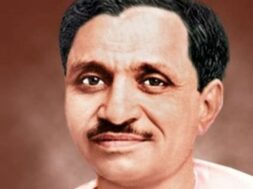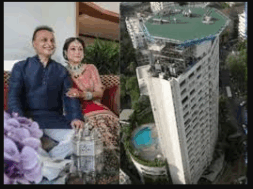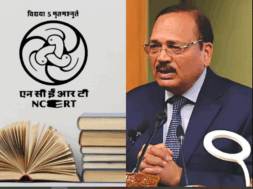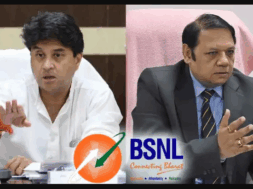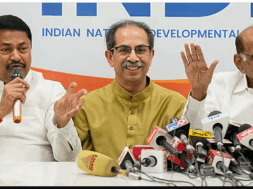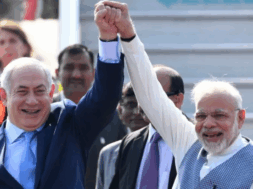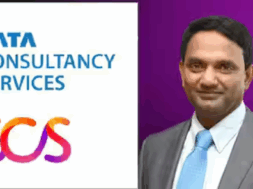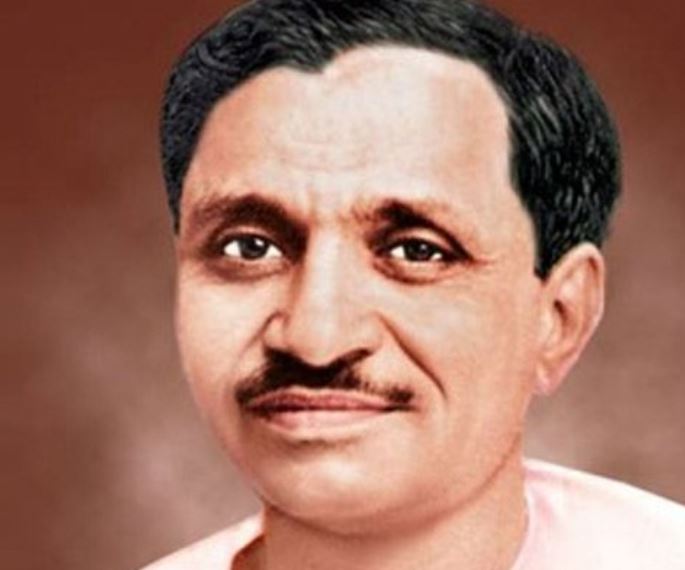
Remembering Eminent Bhartiya Thinker Pandit Deendayal Upadhyaya on His 105th Birth Anniversary
Ahmedabad, September, 25: Pandit Deendayal Upadhyaya was an eminent Bharatiya thinker, economist, writer, editor, political scientist, journalist, sociologist, historian, thinker, employer and philosopher, social worker and politician. He who was one of the leading lights of the Bharatiya Jana Sangh, the erstwhile avtar of the present day Bharatiya Janata Party.
Deendayal was a proponent of an alternative model of governance and politics. He argued that neither communism nor capitalism were suitable for Bharat. Upadhyaya conceived the political philosophy Integral Humanism. He believed in Swaraj (“Self-governance”). He is also well known for the giving mantra of Antyodaya to the country- bringing the last person in the line to the first person in the queue. He died under suspicious circumstances and was found dead on 11 February 1968 at Mughal Sarai railway yard (now known as Pt. Deendayal Upadhyaya Junction named after him).
Quotes about Deendayal Upadhyaya
“If I could get two or three more Deendayals, I will change the entire political map of Bharat.” Dr Syama Prasad Mookerjee, quoted in L.K. Advani, My Country My Life (2008)
Quotes by Deendayal Upadhyaya
“The English word Religion is not the correct word for Dharma.”
“Religion means a creed or a sect and it does not mean Dharma.”
“A nation is a group of persons who live with ‘A Goal’, ‘An Ideal’, ‘A Mission’ and look upon a particular piece of land as the Motherland. If either of the two- The Ideal and The Motherland- is missing, then there is no nation.”
“Here in Bharat, we have placed before ourselves the ideal of the four-fold responsibilities of catering to the needs of Body, Mind, Intellect and Soul with a view to achieve the integrated progress of Man.”
“Hegel put forward the principles of thesis, anti-thesis and synthesis; Karl Marx used this principle as a basis and presented his analysis of history and economics; Darwin considered the principle of survival of the fittest as the sole basis of life; but we in this country saw the basic unity of all life.”
“There is diversity and plurality in life but we have always attempted to discover the unity behind them.”
Pandit Deendayal Upadhyaya is one of the most influential Bharatiya political thinkers of modern times. He is perhaps the only Bharatiya political philosopher and practitioner of modern times, who acquired all the tenets of his thinking from vast Bharatiya culture and enormous sources of ancient Bharatiya knowledge tradition.
His exceptional understanding of both capitalism and communism facilitated him with enormous rational background to reject both of these ideologies and plead for an all-encompassing Bharatiya alternative of Integral Humanism, the idea which hitherto remained neglected. He proposed idea based on ancient roots oriented towards facing contemporary challenges with an eye on future possibilities. This is why articulation of his writings has substantial relevance to provide Bharatiya vision of political thinking and proposing global alternatives.
Life of Pandit Deendayal Upadhayaya has been grueling and unfortunately difficult but in spite of his troubling personal life, he did exceedingly well academically. He stood first class first in his tenth Ajmer Board, securing a distinction in every subject for which he was awarded gold medal and scholarship by Maharaja Kalyan Singh of Sikar. He went to Pilani for pursuing intermediate and yet again won a gold medal and scholarship by Ghanshyam Das Birla.
Deendayal went to Kanpur and joined Sanatan Dharm College for pursuing Bachelor degree in English Literature. His friend Balwant Mahashabde played an instrumental role in him joining the RSS in 1937. A few years later, he became an RSS pracharak. He came in contact with Dr. Hedgewar-the founder of R S S and gradually started devoting time to the activities of the organization.
After passing graduation with first class he went to St. John’s College, Agra for pursuing his post-graduation, he successfully took the Administrative Service Examination, where during the selection interview he was ridiculed for wearing dhoti, kurta and cap. This was the first instance of him being called Panditji, although in the later days of his life it was used with immense affection by his followers. The death of his cousin Ramo Devi sent him into despair and subsequently he left Master’s degree unfinished, despite securing first class results in the first year. His maternal uncle persuaded him to sit for the Provincial Services Exam, which he passed and he was selected after interview. But he was not interested in administrative service. In the year 1941, he moved to Prayag to pursue B.T. course.
Being under extreme suffering and deprived conditions that could crash any ordinary individual but Deendayal drew strength from negative forces and hardships bestowed upon him by nature and developed a unique personality to rise above his circumstances. After declining the administrative post, he was even offered headmastership of a higher secondary school.
He dedicated his entire life for the aim and mission of the organization and to organize the society on the ideas and principles of R.S.S. Shanti Bhushan writes, “Deendayal always wanted to dedicate his life to the country, because he believed that service of the country was not possible after taking up a government job while the country was in bondage. So he dedicated his life to the service of the country, and for this he chose the medium of the R.S.S.” In 1940, the founder of R.S.S. Dr.Hedgewar died and Muslim League was intensely demanding a separate Muslim state.
From 1942 onward, he dedicated himself to full time work in R.S.S., attended forty-day summer vacation R.S.S. camp at Nagpur and hence, became a lifelong pracharak after successfully finishing two year training in the R.S.S. education wing. He was regarded as an ideal swayam sevak essentially because his discourse reflected the pure thought-current of the Sangh. He earned reputation and acclaim be- cause of his hard work, dedication, sheer grit, capacity, sincerity, organisational skills, loyalty and commitment. Nanaji Deshmukh writes, “Deendayal was gifted with a many-faceted personality. He was an extraordinary successful organiser and had the knack for keeping people together. His role in the growth and development of the R.S.S. in Uttar Pradesh was very significant.”
Deendayal steered and geared up the organisational work by professing the ideas of R.S.S. and by exhibiting academic talent through various journals. For spreading the ideology of Hindutva nationalism in 1945, he established Rashtra Dharma Prakashan in Lucknow, from where he launched a monthly magazine Rashtra Dharma and in 1948, a weekly Panchjanya and in 1949, a daily Swadesh (now replaced by Tarun Bharat) was also published from Lucknow. In 1946 and 1947, he wrote two books, namely Samrat Chandragupta and Jagat Guru Sankracharya. Later, he expressed his ideas in philosophical essays and a number of speeches.
Deendayal believed in converting the ideas into a reality, he said, ‘We do have before our eyes a vision of a great future for this country; we are not mere visionaries but are Karamyogis, resolved to translate our vision into reality” In a commentary, Satyavrata Singh writes, “It is true that Deendayal never received from the people and the press the same attention as the known leaders of other political parties did both before and after independence.”
Thinking of Deendayal Upadhyaya essentially fills the gap of integrated and multi- dimensional attempts to visualise the future Bharat in post- independent scenario. His philosophy of integral humanism presents before us a well organised and well thought of body of philosophy which is inspired by universal values of perennial tradition of Bharatiya thinking. Deendayal Upadhyaya makes earnest attempts to synchronise the all time cultural and ethical tradition of spirituality, morality and acceptability of diverse ideas with modern instruments of democracy. He also tries to present before us the fundamentality of dialogue, discussion, debate and discourse in a contemporary shape with traditional foundations.
Deendayal Upadhyaya was also influenced by the concept of democracy. He says “the people of this country have an abiding faith in nationalism and democracy and they will not tolerate elements who seek to subvert these values.” He goes on to say “Democracy has been defined as government by debate. Bhartiya culture goes beyond this and looks at debate as a means of realisation of truth.”
Deendayal Upadhyaya has touched upon a large number of issues ranging from secularism to majoritarianism, Dharma to society, state to individual, market to profit, nation to nationalism, democracy to culture, constitution to decentralization, legislature to judiciary, education to employment, Bhartiya to Swadeshi and so on. Therefore, he attempts to address most of the issues of contemporary relevance and to provide an alternative perspective to the solutions.
